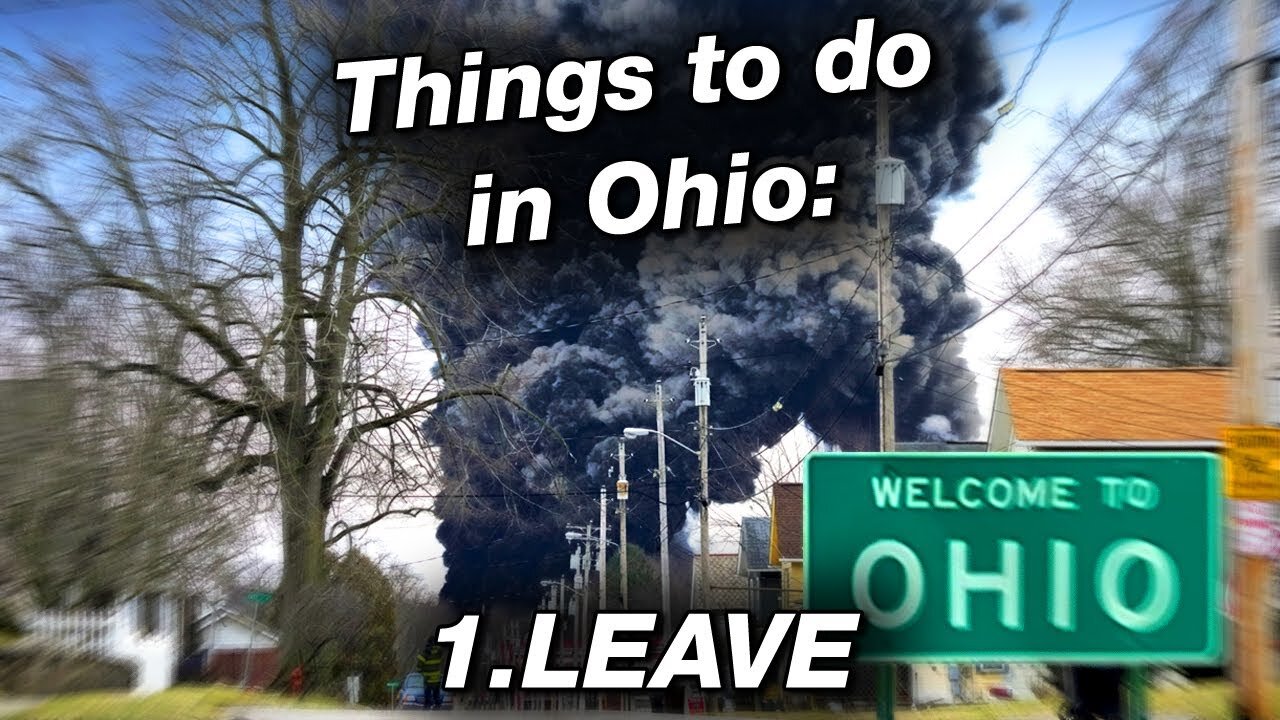Premium Only Content

THIS IS HOW JOE BIDEN IS KILLING OHIO || ABOUT OHIO AND EAST PALESTINE TRAIN ACCIDENT
THIS IS HOW JOE BIDEN IS KILLING OHIO || YOU NEED TO HEAR THIS OUT ABOUT OHIO AND EAST PALESTINE
2023 Ohio train derailment
The 2023 Ohio train derailment (also called the East Palestine train derailment) occurred on February 3, 2023, at 8:55 p.m. EST (UTC−5), when 38 cars of a Norfolk Southern freight train carrying hazardous materials derailed in East Palestine, Ohio, United States.[1] Several railcars burned for more than two days, and then emergency crews conducted a controlled burn of several railcars at the request of state officials,[2] which released hydrogen chloride and phosgene into the air.[1] As a result, residents within a 1-mile (1.6-kilometer) radius were evacuated, and an emergency response was initiated from agencies in Ohio, Pennsylvania, and West Virginia.
Background
The derailed train was Norfolk Southern train 32N[3] operating from the Terminal Railroad Association of St. Louis yard in Madison, Illinois, to Norfolk Southern's Conway Yard in Conway, Pennsylvania, on the Fort Wayne Line. Aboard the 9,300 feet (1.76 mi; 2.8 km) long train[4] were an engineer, conductor, and conductor trainee.[5] The train consisted of 141 loaded cars and 9 empty cars.[6] Other reports note one more car, for a total of 151 cars, weighing 18,000 tons.[7]
Of those cars, 20 were carrying hazardous materials, including chloroethene (vinyl chloride), butyl acrylate, 2-ethylhexyl acrylate, ethylene glycol monobutyl ether, isobutylene, combustible liquids, and benzene residue.[8][9][10] The train departed Madison on February 1, and had suffered at least one mechanical failure before the derailment.[11]
Derailment
Smoke from the accident, on February 3
Video of smoke and fire
Security footage from a business in Salem, Ohio (20 miles [32 km] NW from East Palestine), and a Ring doorbell camera from New Waterford, Ohio (4 miles [6 km] NW from East Palestine), show fire emanating from underneath a rail car.[12][13][14] After this, at around 8:55 pm EST on February 3, 2023, 51 cars derailed on the east side of town, near the border with Pennsylvania. 49 of the cars ended up in a derailment pile, which caught fire and burned for several days.[15][16] Of the 51 derailed cars, 11 of them were tank cars which dumped 100,000 gallons of hazardous materials, including vinyl chloride, benzene residue, and butyl acrylate.[17][18][19]
List of derailed cars carrying high-hazard chemicals[18]
Line # Car ID Contents Capacity Hazard class
28 TILX 402025 Vinyl chloride (stabilized) 25,800 US gallons (98,000 L) 2.1 (flammable gas)
29 OCPX 80235 Vinyl chloride (stabilized) 25,800 US gallons (98,000 L) 2.1 (flammable gas)
30 OCPX 80179 Vinyl chloride (stabilized) 25,800 US gallons (98,000 L) 2.1 (flammable gas)
31 GATX 95098 Vinyl chloride (stabilized) 25,800 US gallons (98,000 L) 2.1 (flammable gas)
36 SHPX 211226 2-Butoxyethanol 30,110 US gallons (114,000 L) Combustible liquid
38 DOWX 73168 2-Ethylhexyl acrylate 25,800 US gallons (98,000 L) Combustible liquid
49 NATX 35844 Isobutylene 30,110 US gallons (114,000 L) 2.1 (flammable gas)
50 UTLX 205907 Butyl acrylate (stabilized) 30,110 US gallons (114,000 L) 3 (flammable liquid)
55 OCPX 80370 Vinyl chloride (stabilized) 25,800 US gallons (98,000 L) 2.1 (flammable gas)
59 DPRX 259013 Benzene 30,110 US gallons (114,000 L) 3 (flammable liquid)
60 DPRX 258671 Benzene 30,110 US gallons (114,000 L) 3 (flammable liquid)
About 48 hours later, the NTSB released preliminary findings indicating that the derailment was caused by a mechanical problem on one of the railcars' trucks,[20][5] which may be connected to reports that an axle was observed throwing sparks about an hour before.[21] The crew received an alarm from a wayside defect detector shortly before the derailment indicating a mechanical problem, and then an emergency brake application initiated.[22]
Emergency response and burn off
The crash site on February 5
Air monitoring device
Workers digging up a creek and filtering the water at the entrance to a park
Clean up of a small creek
Nearly 70 emergency agencies from Ohio, West Virginia, and Pennsylvania mobilized in response.[23] East Palestine Mayor Trent Conaway declared a state of emergency.[24]
Norfolk Southern personnel were first to respond on February 3.[25] On February 4, they noticed water spillage into Sulphur Run and Leslie Run, and installed booms and underflow dams to separate the floating pollutant. The U.S. Environmental Protection Agency (EPA) began monitoring air quality on February 3. According to the EPA, humans can smell butyl acrylate at a concentration lower than the screening level (exposure limit).[26] The National Institute for Occupational Safety and Health (NIOSH) recommended exposure limit for butyl acrylate is time-weighted average 10 ppm (55 mg/m3).[27]
On February 5, a temperature change in one of the train cars caused fears of an explosion with the potential to disperse shrapnel as the fires continued to burn.[16] Although five cars containing vinyl chloride remained intact following the crash,[28] the relief valve on one of the cars had malfunctioned.[29] Ohio Governor Mike DeWine activated the Ohio National Guard to assist local authorities in what he called "a matter of life and death".[16][30] Pennsylvania Governor Josh Shapiro ordered an evacuation in areas of Beaver County which bordered the site.[23] Officials in both states went door-to-door to evacuate residents.[31] The fire from the accident burned until February 5.[26]
On February 6, DeWine and Shapiro ordered the mandatory evacuation of all residents within a 1-by-2-mile (1.6 by 3.2 km) area.[16] In an effort to prevent further explosions, Norfolk Southern emergency crews conducted a controlled release and burn of the five tanks of vinyl chloride into the air.[32] Small shaped charges were used to breach the tank cars, and the vinyl chloride was allowed to flow into a trench, where it was ignited by flares.[33] The burn caused black clouds to form above the area, and released phosgene and hydrogen chloride into the air.[9] Although officials reported that air quality readings were not showing anything concerning,[34] residents in nearby Mahoning and Trumbull counties reported a chemical smell in their areas. Officials in the Youngstown region advised residents to stay indoors.[35] Air monitoring conducted on February 7–8 revealed an increase in volatile organic compounds (VOCs) in the air below the screening level and an increase in particulate matter, probably from the soot.[26]
On February 8, state and federal EPA workers noticed oily spillage on the soil and notified Norfolk Southern, which began removing it with a vacuum truck.[26]
On the evening of February 8, Norfolk Southern resumed traffic through the town. East Palestine Mayor Trent Conaway said that he was displeased because the railroad had said that trains would not run again until all residents were able to return to their homes.[36][37]
The evacuation was lifted on February 9 after the EPA reported that the air inside and outside the evacuation zone had returned to normal levels.[38] Although toxicants were detected at the derailment site, they were not detected outside the area. The Ohio EPA also reported that drinking water (sourced from different waterways) was safe. In a testing report from February 8, the Ohio EPA showed WKBN-TV that vinyl chloride, benzene, some chlorinated organic compounds, and other VOCs were not detected in the water.[39]
On February 16 the Environmental Protection Agency administrator Michael S. Regan visited the scene to provide assistance.[40]
Health and environmental concerns
Norfolk Southern contractors during cleanup operations at the crash site on February 7
The Ohio Department of Natural Resources stated the chemical spill killed an estimated 3,500 small fish across 7.5 mi (12 km) of streams as of February 8.[41] Several captive foxes at Parker Dairy became sick over the following weekend, and one died, which its owner attributed to the derailment.[42] Material from the crash was observed in storm drains and detected in samples from Sulphur Run, Leslie Run, Bull Creek, North Fork Little Beaver Creek, Little Beaver Creek, and the Ohio River. An oily product was seen seeping into the soil. Emergency response staff are assessing potential impacts[clarification needed] on aquatic life.[32][26] On February 23 Mary Mertz, director of the Ohio Department of Natural Resources stated that the derailment potentially killed more than 43,000 fish, crustaceans, amphibians and other marine animals. State officials said that they have not yet seen deaths or other negative effects on animals living on the land.[43]
Neil Donahue, a chemistry professor at Carnegie Mellon University, expressed concern about the potential production of dioxins during the burning of vinyl chloride, while Lynn Goldman, dean of the Milken Institute School of Public Health, worried more about residual vinyl chloride. Gaseous pollutants dissipate quickly in the air, but dioxins are persistent.[44]
The Bristol Panthers girls basketball team forfeited their Ohio High School Athletic Association tournament road game against the East Palestine Bulldogs,[45] citing safety concerns.[46]
William M. Diesslin, board chair of the Institute of Hazardous Materials Management[47][48][49] suggested that burning vinyl chloride was "the lesser of two evils", from reading from the emergency response guide and from safety data sheets.[50][51]
Lawsuits and compensation
On February 8, affected businesses and residents filed three class action lawsuits against Norfolk Southern Railway.[52][53] One demands the company to pay for the medical screenings and treatments of people living within a 30 mi (48 km) radius of the derailment.[54] Norfolk Southern Railway offered $1,000 payments to locals to "cover costs related to the evacuation". Some residents expressed concerns that taking these payouts would limit their ability to join future legal actions.[55]
On February 4, 2023, Norfolk Southern made a donation of $25,000 to the Red Cross to support its efforts in East Palestine.[56] On February 14, the company pledged a $1 million "community support fund", and free chemical testing of air, water, and soil. On February 16, the support fund was increased to $2.5 million.[57]
On February 21, 2023, the EPA ordered Norfolk Southern to find and clean contaminated water and soil, and to pay for the EPA's own cleaning efforts.[58]
Reactions
Commentary following the derailment centered around industry working conditions and safety concerns, such as the lack of modern brake safety regulations,[59] the implementation of precision scheduled railroading (PSR),[60] reduced railway workers per train, and increased train lengths and weight. Critics said that train companies have failed to invest in train maintenance to prevent accidents, even though they conduct stock buybacks, in which capital that could be used on maintenance and safety measures is instead distributed to existing shareholders.[61][62]
On February 14, Governor Mike DeWine told reporters that he was not seeing any problems in the area after the controlled release of chemicals and that President Joe Biden had offered federal assistance but DeWine said that no further assistance was necessary.[63][64]
A town hall meeting was held on February 15 between residents and local, state, and federal officials. Norfolk Southern representatives declined to attend due to a perceived physical threat. Some residents expressed distrust in the company and government.[65]
On February 16, DeWine released a statement saying after speaking with the White House, he requested more aid from the U.S. Department of Health and Human Services (HHS), the Health and Emergency Response Team (HERT), and the Centers for Disease Control and Prevention (CDC). DeWine also said his office had been informed by the Federal Emergency Management Agency (FEMA) that it was not eligible for FEMA assistance. He said during a press conference on February 17 "although FEMA is synonymous with disaster support, they're most typically involved with disasters where there is tremendous home or property damage", such as tornadoes, flooding, or hurricanes.[66] Biden's spokesperson said FEMA was supporting the other agencies which were better matched to this type of disaster.[67]
Health teams from the CDC and HHS were expected to arrive as early as February 20.[68]
Former President Donald Trump visited East Palestine on February 22, giving a speech a half a mile away from the wreckage in which he criticized the federal response to the disaster and offered relief.[69][70] Trump provided gallons of bottled "Trump Spring Water" for the community, walked through East Palestine, flanked by his son Donald Trump Jr. and Ohio Senator J.D. Vance and then visited a local McDonald's to purchase food for the first responders.[71]
On the evening of February 22, Gov. DeWine, EPA Administrator Regan and Norfolk Southern CEO Alan Shaw appeared at a CNN town hall in East Palestine, and Shaw apologized to the community's residents. "I'm terribly sorry for what has happened to your community." He added, "I want you to know that Norfolk Southern is here, and we're going to stay here. And we're going to make this right."[72]
In the aftermath of the disaster, Norfolk Southern was accused of prioritizing $10 billion stock buybacks[73] for shareholders instead of maintenance.[74] Shaw has been accused of sidestepping questions about Norfolk Southern's support for then president Trump's 2017 overturning of the Obama administration requirement for ECP brakes and Norfolk Southern's pressing the federal government against a rule that in most cases would require more than one person operating a freight train.[75][76]
Several unions and consumer organizations have expressed concern with regard to private ownership of railways and a "profit-driven approach", which they claim puts workers and communities at high risk. The United Electrical, Radio and Machine Workers of America (UE) also called for public ownership of the US railway systems.[77]
The Biden administration and U.S. Secretary of Transportation Pete Buttigieg have received criticism over their response to the derailment, with some lawmakers and locals of East Palestine describing the response as delayed and lackluster.[78] East Palestine's mayor criticized Biden's visit to Ukraine amid the derailment crisis.[79] Buttigieg received backlash from right-wing and Republican lawmakers, as well as from some on the political left.[79][80] The Biden administration defended their response to the derailment saying they had "mobilized a robust, multi-agency effort to support the people of East Palestine, Ohio."[81]
Brakes
Main article: Electronically controlled pneumatic brakes
Electronically controlled pneumatic (ECP) brakes may potentially reduce stopping distances by up to 60 percent over conventional railway air brakes.[59] The derailed train was not equipped with ECP brakes, which former Federal Railroad Administration official Steven Ditmeyer said would have mitigated the severity of the accident. The Obama administration proposed rules safety regulations for trains carrying hazardous materials in 2014; these were weakened by lobbying from the railway industry. In 2017, further lobbying persuaded the Trump administration to begin a repeal of the regulations requiring the use of such brakes on trains.[59]
The U.S. Department of Transportation's Pipeline and Hazardous Materials Safety Administration (PHMSA) said the FAST Act, enacted by the Republican-controlled 114th United States Congress and signed by President Barack Obama, instead required them to repeal ECP brake mandates, after a regulatory impact analysis report stated, "the expected costs of ECP brakes are significantly higher than the expected benefit" in 2018.[82] The Trump administration finalized a roll back of the requirement for electronically controlled brakes in September 2018.[83] The National Transportation Safety Board (NTSB) has recommended this technology for all trains.[84] As of 2023, the Biden administration had not reinstated this ruling,[59] and transportation secretary Pete Buttigieg made a tweet claiming that this technology may have prevented the derailment.[85]
NTSB chair Jennifer Homendy explained that the train in this accident would not have been required to utilize the ECP braking system even if the FAST Act was not repealed, because the term high-hazard flammable train means a single train transporting 20 or more tank cars loaded with a Class 3 flammable liquid. As it had only three such placarded train cars, the derailed train did not meet the qualifications of a "high-hazard flammable" train.[85]
Misinformation
The derailment sparked the spread and circulation of misinformation, fake news, and conspiracy theories. Some of the most frequently repeated claims—most of which were heavy exaggerations of the derailment and the events surrounding it—included these allegations:[86][87][88][89][90]
The train cars had exploded (as opposed to a controlled burn), with crews or police responsible
The government had locked down East Palestine
Local residents who had been evacuated or left were ordered not to return
Some commentators alleged that concurrently-reported high-altitude object events were being overemphasized or even faked as a red herring to distract the public from the derailment or cover it up entirely.[86] Conspiracy theorists, such as congresswoman Marjorie Taylor Greene and football player Aaron Rodgers, claimed the U.S. government had faked the high-altitude objects to distract from the derailment, allegations of American responsibility for the Nord Stream pipeline sabotage, and the release of Jeffrey Epstein's client list.[91][92] Chinese Ministry of Foreign Affairs spokeswoman Hua Chunying and South China Morning Post columnist Alex Lo suggested Western media organizations were deliberately overemphasizing high-altitude object stories over the derailment, though neither suggested a clear reason as to why.[93][94] However, the derailment received constant coverage from news outlets since the initial derailment,[87][95] though Media Matters for America noted most television news coverage did not cover it in depth and presented it merely "as an accident", with little mention of railway industry lobbying or safety regulation concerns.[96]
A Wired editorial noted that while social media attention increased coverage on traditional media outlets, it also created a "perfect storm" for alarmist posts and conspiracy theories.[97]
Allegations that police were arresting journalists attempting to report on the incident were also false. Only one journalist was arrested—NewsNation reporter Evan Lambert on February 8 for disorderly conduct and trespassing[98][99]—but this was recorded live in a room full of witnesses and other journalists (making any attempt at a cover-up impractical),[100] and charges against Lambert were dismissed on February 15, with him freely continuing to report on the derailment after his release.[101][102] The U.S. Press Freedom Tracker and the Committee to Protect Journalists have reported no further arrests since Lambert's, nor have they been aware of any press restrictions.[87][95][100]
Criticizing the spread of misinformation in regard to the derailment, NTSB Chair Jennifer Homendy urged the public to let the NTSB investigate and stop "adding pain to a community that's been through enough", adding that if people genuinely wanted to help, the NTSB was hiring.[103]
White Noise
The derailment has been compared to the Netflix film White Noise,[104] a 2022 film about a cataclysmic train accident that creates a plume of toxic chemical waste over an Ohio town. It was adapted from the 1985 novel with the same title. The central character, Jack Gladney, teaches at an Ohio college. The film was shot in Salem, Ohio (20 miles away), Cleveland, on the campuses of Akron University and Kent State University, and elsewhere around the state.[105]
-
 2:15:15
2:15:15
vivafrei
22 hours agoEp. 249: Confirmation Hearings RECAP! Canada-U.S. TRADE WAR? Bureaucrats Sue Trump! Viva Barnes Live
174K435 -
 4:51:59
4:51:59
MyronGainesX
15 hours agoIRS Auctions Off Tekashi 69's Possessions
188K28 -
 DVR
DVR
Vigilant News Network
1 day agoRFK Jr. Hearing EXPOSES Corrupt Politicians in Humiliating Scandal | Media Blackout
194K57 -
 1:11:40
1:11:40
Josh Pate's College Football Show
13 hours ago $6.17 earnedPerfect CFB Conferences | Big Ohio State Changes | Canceling Spring Games | SEC 2025 Thoughts
69.3K2 -
 1:08:07
1:08:07
Bek Lover Podcast
11 hours agoInteresting Times with Bek Lover Podcast
37.8K -
 1:51:12
1:51:12
Tate Speech by Andrew Tate
15 hours agoEMERGENCY MEETING EPISODE 105 - UNBURDENED
216K109 -
 1:01:18
1:01:18
Tactical Advisor
17 hours agoBuilding a 308 AR10 Live! | Vault Room Live Stream 016
196K20 -
 2:17:02
2:17:02
Tundra Tactical
1 day ago $30.11 earnedTundra Nation Live : Shawn Of S2 Armament Joins The Boys
280K29 -
 23:22
23:22
MYLUNCHBREAK CHANNEL PAGE
2 days agoUnder The Necropolis - Pt 5
218K71 -
 54:05
54:05
TheGetCanceledPodcast
1 day ago $15.27 earnedThe GCP Ep.11 | Smack White Talks Smack DVD Vs WorldStar, Battle Rap, Universal Hood Pass & More...
209K36